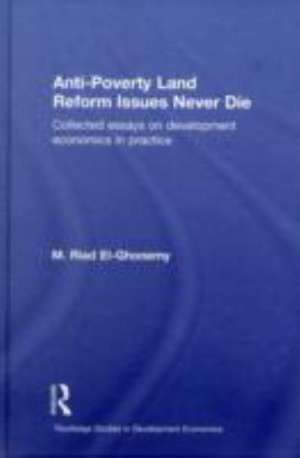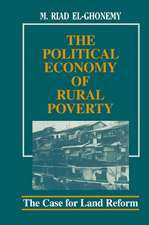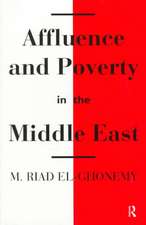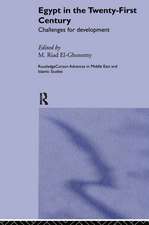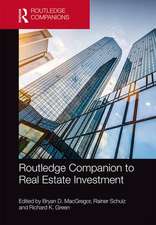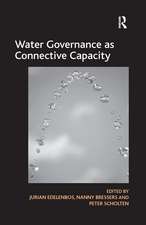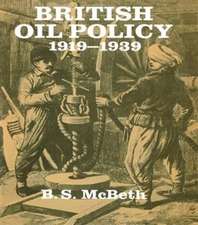Anti-Poverty Land Reform Issues Never Die: Collected essays on development economics in practice: Routledge Studies in Development Economics
Autor M. Riad El-Ghonemyen Limba Engleză Hardback – 3 iul 2009
The ever-topical central theme in this collection of essays is the mixed role of government and the institutionally regulated market in tackling rural poverty and land distribution inequality. Drawing on over half a century of M. Riad El-Ghonemy’s academic and field experience in developing countries across Africa, Latin America, the Middle East and South East Asia, this is a comprehensive record of the late-twentieth century study of and struggle against rural inequality, seen through the eyes of one of its foremost observers.
Containing a balance of in-depth field studies and El-Ghonemy’s personal observations from 1952 onwards, this volume provides the basis for discussion and debate on a range of developmental issues. Foremost among these is the appropriate approach both to explain the factors underlying developing countries' rural backwardness, and to enable them to achieve the Millennium Development Goal of halving the incidence of poverty and hunger by 2015. The compelling argument made here is that redistributive land reform, combined with non-farm intensive employment opportunities and investment in education within rural areas are necessary to tackle persistent poverty effectively.
Anti-Poverty Land Reform Issues Never Die is essential reading for undergraduate and postgraduate students learning rural development and institutional and development economics.
M.Riad El-Ghonemy is Senior Research Associate at the Department of International Development, University of Oxford and Research Fellow at the Department of Economics, the American University in Cairo, and Emeritus Professor, Ein-Shams University, Cairo. He is the author of several publications, including The Political Economy of Rural Poverty, Routledge (1990).
| Toate formatele și edițiile | Preț | Express |
|---|---|---|
| Paperback (1) | 412.37 lei 43-57 zile | |
| Taylor & Francis – 7 apr 2015 | 412.37 lei 43-57 zile | |
| Hardback (1) | 1060.52 lei 43-57 zile | |
| Taylor & Francis – 3 iul 2009 | 1060.52 lei 43-57 zile |
Din seria Routledge Studies in Development Economics
-
 Preț: 309.74 lei
Preț: 309.74 lei -
 Preț: 327.17 lei
Preț: 327.17 lei -
 Preț: 326.49 lei
Preț: 326.49 lei -
 Preț: 311.41 lei
Preț: 311.41 lei -
 Preț: 394.37 lei
Preț: 394.37 lei - 8%
 Preț: 396.84 lei
Preț: 396.84 lei -
 Preț: 260.82 lei
Preț: 260.82 lei - 18%
 Preț: 1165.24 lei
Preț: 1165.24 lei - 15%
 Preț: 470.31 lei
Preț: 470.31 lei - 18%
 Preț: 1057.05 lei
Preț: 1057.05 lei - 18%
 Preț: 1225.29 lei
Preț: 1225.29 lei - 18%
 Preț: 1113.63 lei
Preț: 1113.63 lei - 18%
 Preț: 1300.62 lei
Preț: 1300.62 lei - 26%
 Preț: 878.42 lei
Preț: 878.42 lei - 18%
 Preț: 1166.05 lei
Preț: 1166.05 lei - 18%
 Preț: 1059.45 lei
Preț: 1059.45 lei -
 Preț: 381.11 lei
Preț: 381.11 lei - 25%
 Preț: 823.63 lei
Preț: 823.63 lei - 21%
 Preț: 361.84 lei
Preț: 361.84 lei - 16%
 Preț: 274.01 lei
Preț: 274.01 lei - 18%
 Preț: 1060.87 lei
Preț: 1060.87 lei - 18%
 Preț: 1168.85 lei
Preț: 1168.85 lei - 18%
 Preț: 1171.89 lei
Preț: 1171.89 lei - 18%
 Preț: 1068.18 lei
Preț: 1068.18 lei - 18%
 Preț: 1060.19 lei
Preț: 1060.19 lei - 18%
 Preț: 1341.98 lei
Preț: 1341.98 lei - 18%
 Preț: 1169.16 lei
Preț: 1169.16 lei - 18%
 Preț: 1057.05 lei
Preț: 1057.05 lei - 15%
 Preț: 714.66 lei
Preț: 714.66 lei - 18%
 Preț: 1287.06 lei
Preț: 1287.06 lei - 18%
 Preț: 1124.73 lei
Preț: 1124.73 lei - 18%
 Preț: 1157.34 lei
Preț: 1157.34 lei - 27%
 Preț: 832.80 lei
Preț: 832.80 lei - 26%
 Preț: 850.91 lei
Preț: 850.91 lei - 18%
 Preț: 1066.79 lei
Preț: 1066.79 lei - 25%
 Preț: 658.19 lei
Preț: 658.19 lei - 25%
 Preț: 992.63 lei
Preț: 992.63 lei - 18%
 Preț: 1069.23 lei
Preț: 1069.23 lei - 15%
 Preț: 703.08 lei
Preț: 703.08 lei -
 Preț: 395.63 lei
Preț: 395.63 lei - 18%
 Preț: 706.91 lei
Preț: 706.91 lei -
 Preț: 422.96 lei
Preț: 422.96 lei - 18%
 Preț: 1055.38 lei
Preț: 1055.38 lei - 27%
 Preț: 993.85 lei
Preț: 993.85 lei - 18%
 Preț: 707.10 lei
Preț: 707.10 lei -
 Preț: 409.19 lei
Preț: 409.19 lei
Preț: 1060.52 lei
Preț vechi: 1293.32 lei
-18% Nou
Puncte Express: 1591
Preț estimativ în valută:
202.93€ • 212.41$ • 168.90£
202.93€ • 212.41$ • 168.90£
Carte tipărită la comandă
Livrare economică 31 martie-14 aprilie
Preluare comenzi: 021 569.72.76
Specificații
ISBN-13: 9780415497015
ISBN-10: 0415497019
Pagini: 248
Ilustrații: 2
Dimensiuni: 156 x 234 x 19 mm
Greutate: 0.62 kg
Ediția:New.
Editura: Taylor & Francis
Colecția Routledge
Seria Routledge Studies in Development Economics
Locul publicării:Oxford, United Kingdom
ISBN-10: 0415497019
Pagini: 248
Ilustrații: 2
Dimensiuni: 156 x 234 x 19 mm
Greutate: 0.62 kg
Ediția:New.
Editura: Taylor & Francis
Colecția Routledge
Seria Routledge Studies in Development Economics
Locul publicării:Oxford, United Kingdom
Public țintă
Postgraduate and UndergraduateCuprins
Introduction: aims and questions addressed
Part 1 Development Policy Issues
1. What Does Participation of the Poor in Development Mean?
2. Are the Neglect of Agriculture and Land Concentration Responsible for Increasing Poverty and Slow economic Growth in Developing Countries?
3. The Distortion of Rural Development Issues
4. The Economics of Agricultural Land Fragmentation
5. The Impact of Multinational Corporations on Land Tenure and Agricultural Labour in Developing Countries
6. The Peasants’ Command over their Food Needs and Labour Employment is a strong Justification for Redistributive Land Reform
7. The Rationale for Anti-Poverty Land Reform?
8. Agrarian Reform and Rural Development: lessons learnt and prospects
Part 2 Country- and Region-Specific Essays 9. The Role of Land Tenure Institution in The Social Structure of Pre-Land Reform Egypt: a case study
10. The Labour and Capital Markets in the Mid-Twentieth Century Egyptian Agriculture
11. Land Property Rights and their Diverse Adjustments in Latin America during the 1950s
12. The Development of Tribal Agricultural Lands and Transformation of Nomadism to Settled Farming in Libya
13. The Contribution of Reforming the Land Tenure System to Food Security and Economic Development in the Middle East
14. Land Reform in Egypt and the Philippines: similarities, differences, and challenges
15. The Roles of the State and Market in Land Property Transfer: lessons from Egypt regarding the Soviet Union’s agrarian ‘Glasnost’
16. Land Reform and Rural Development in North Africa
17. The Prospects for Rural Development in Africa
Part 1 Development Policy Issues
1. What Does Participation of the Poor in Development Mean?
2. Are the Neglect of Agriculture and Land Concentration Responsible for Increasing Poverty and Slow economic Growth in Developing Countries?
3. The Distortion of Rural Development Issues
4. The Economics of Agricultural Land Fragmentation
5. The Impact of Multinational Corporations on Land Tenure and Agricultural Labour in Developing Countries
6. The Peasants’ Command over their Food Needs and Labour Employment is a strong Justification for Redistributive Land Reform
7. The Rationale for Anti-Poverty Land Reform?
8. Agrarian Reform and Rural Development: lessons learnt and prospects
Part 2 Country- and Region-Specific Essays 9. The Role of Land Tenure Institution in The Social Structure of Pre-Land Reform Egypt: a case study
10. The Labour and Capital Markets in the Mid-Twentieth Century Egyptian Agriculture
11. Land Property Rights and their Diverse Adjustments in Latin America during the 1950s
12. The Development of Tribal Agricultural Lands and Transformation of Nomadism to Settled Farming in Libya
13. The Contribution of Reforming the Land Tenure System to Food Security and Economic Development in the Middle East
14. Land Reform in Egypt and the Philippines: similarities, differences, and challenges
15. The Roles of the State and Market in Land Property Transfer: lessons from Egypt regarding the Soviet Union’s agrarian ‘Glasnost’
16. Land Reform and Rural Development in North Africa
17. The Prospects for Rural Development in Africa
